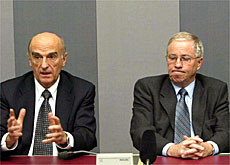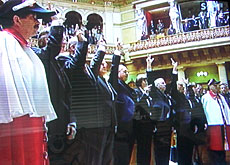Finance for Merz, while Blocher gets justice

The new Swiss ministers, Christoph Blocher and Hans-Rudolf Merz, have been allocated their portfolios, four days after being elected to the cabinet.
Rightwinger Blocher takes charge of justice and police affairs – which includes asylum policy – while Merz is the new finance minister.
Both Blocher and Merz had wanted the finance portfolio, said the Swiss president, Pascal Couchepin.
But both men accepted the posts they were offered during a meeting of the newly elected cabinet on Sunday to decide the allocation of portfolios.
Their first meeting since the election on December 10 lasted just 15 minutes, said Couchepin.
The remaining cabinet members stated that they wished to retain their current positions, according to the principle of seniority.
Switzerland’s seven-member cabinet, with representatives of the four main parties, divides up cabinet portfolios among themselves, with longer-serving members usually having first choice.
Vacated
The decision by the incumbent members to hold on to their ministries meant that Blocher and Merz had only the finance and justice portfolios to choose from.
Both had been vacated during last week’s cabinet election. Kaspar Villiger retired as finance minister and Ruth Metzler relinquished the justice and police portfolio when she failed to secure enough votes to remain in government.
There had been some speculation that Blocher’s colleague from the People’s Party, Samuel Schmid, wanted to exchange his defence portfolio after being in the driving seat for four years.
Merz’s reputation for financial severity was thought to have been decisive in securing him the finance ministry, leaving the justice ministry for Blocher.
No comment
Blocher said he would not comment on his portfolio until he starts work at the beginning of 2004.
The hardliner from the rightwing Swiss People’s Party will not have much time to get used to his new job. Early next year, he will have to tackle a number of controversial issues.
Among his first tasks will be considering revisions to the law on asylum, followed in February by an initiative in which voters will be asked to decide if untreatable and extremely dangerous sexual and violent offenders should be locked up for life.
Blocher’s hardline position on asylum and foreigners is likely to provoke criticism about his appointment as justice minister from civil liberties’ groups.
In the run-up to October’s parliamentary elections, the United Nations High Commissioner for Refugees (UNHCR) accused Blocher’s People’s Party of anti-asylum propaganda, and distorting the facts.
The People’s Party and Blocher were also behind a referendum last year on toughening the asylum laws. Their proposals – narrowly rejected – would have made Swiss asylum policy among the tightest in Europe.
Marginalised
Announcing the appointments on Sunday, Couchepin rebuffed criticism from women groups that the female sex had been marginalised in the cabinet with the ousting of Metzler.
More than 12,000 demonstrators took to the streets of the capital, Bern, on Saturday, protesting against the “patriarchs” dominating the government.
The president stressed that the composition of the new cabinet was grounded in democratic principles.
Blocher echoed his words, expressing regret that there were not more women in rightwing politics.
swissinfo with agencies
The two vacant portfolios in the Swiss cabinet have been filled.
Christoph Blocher is the new justice minister, while Hans-Rudolf Merz is in charge of finance.
Both men were elected to the cabinet on December 10.
The other cabinet members in order of seniority are:
Moritz Leuenberger, transport minister, Social Democrats
Pascal Couchepin, interior minister, Radicals
Joseph Deiss, economics minister, Christian Democrats
Samuel Schmid, defence minister, Swiss People’s Party
Micheline Calmy-Rey, foreign minister, Social Democrats
The election of Christoph Blocher to the cabinet dealt a death blow to the so-called Magic Formula, which had determined the make-up of the cabinet since 1959.
This allocated the Swiss People’s Party one seat in the cabinet.
The People’s Party demanded a second seat after it emerged as the largest party in October’s parliamentary elections.

In compliance with the JTI standards
More: SWI swissinfo.ch certified by the Journalism Trust Initiative


You can find an overview of ongoing debates with our journalists here. Please join us!
If you want to start a conversation about a topic raised in this article or want to report factual errors, email us at english@swissinfo.ch.